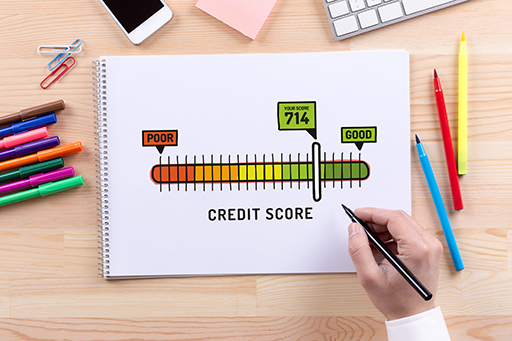3.1 How your credit history is compiled
Now you will look at how the reference agencies compile credit scores.
The agencies don’t have access to, or explore, all your personal information but they do examine the following:
- Have you a county court judgment (CCJ) (in Scotland, a decree) or other court orders indicating that you have a history of debt problems?
- Have you ever been convicted of a fraud?
- Have you ever been the victim of identity theft or fraud?
- Have you ever defaulted on a payment (when the information shows you didn’t pay but should have done)? Defaults normally stay on your reports for 6 years. Are you still in default?
- How do you operate your bank and credit card accounts? For example, do you pay off your credit card bill in full each month? This makes it clear to the agencies that you are in control of your finances.
- How many recent applications for credit have you made? Note, though, that the agencies cannot find out whether you were accepted or rejected when you made these applications. However, they may be able to work out the result by the products you subsequently have.
- Are you on the electoral register? This is one vital piece of non-financial information that will affect your ability to borrow money.
By contrast these are some of the financial and other matters that are not recorded by the reference agencies:
- your income or pension (although they may check that the income you disclose to lenders matches with the income on your bank statement)
- declined applications (the application will be recorded but not the result of it)
- criminal records
- details about your savings and investments
- your medical records or time taken off work for sickness
- your race, religion, ethnicity or any political affiliations (like membership of a political party)
- student loans – although defaults on payments may be taken into account (this is because, as you will see later, student loans are unlike conventional loans)
- your record in making Council Tax payments on time (unless failure to make payments has resulted in a CCJ being recorded)
- the timely payment of fines for driving and parking offences.
Additionally, on any application form, the lender will normally require the following details:
- Your age.
- Your type of employment. This might include confirmation of whether the job is permanent or a fixed-term contract. You may also have to disclose whether you have completed the probationary period that commonly applies when you start a new job.
- Your salary.
- Your marital status.
- Any financial dependents you have, e.g. children.
- Your address.
- Whether your home is owner-occupied or rented, or whether you’re living in someone else’s home – for example, your parent’s house.
As noted earlier, the lenders will not make their lending decisions on the basis of your credit scores, although they may be interested if your scores materially change – particularly if they fall. The focus will be on your credit history and, provided this is satisfactory, on your capability to repay the money you are seeking to borrow. The latter involves ‘affordability testing’ – something you will look at in detail in Session 4. The result of affordability testing may mean that even if applications, say for a loan or credit card, are accepted the amount of the loan or credit granted may be less than hoped for by the applicant.
Activity 3 Creating a good credit history: credit rebuild cards
If you hardly have any credit history, it’s worth getting a specialist credit rebuild card and using it correctly. Why do you think this is?
Answer
You need to build a decent recent history to show that you can be responsible with credit and use it well. The catch-22 is that if you hardly have any credit history, getting credit is difficult.
The solution is to get a credit (re)build card, but you must use it properly to make it work or you’ll get hit with hideous charges.
The providers of these cards charge a very high interest rate but do accept people with a poor credit history or little history at all. Yet provided you just do the normal spending you’d do on a debit card and repay the card in full each month, preferably by direct debit, and never withdraw cash, you won’t be charged interest so it’s no problem.
Provided you have no other issues after six months or so, things should start to improve. After a year, it should make quite a difference to your credit history.

